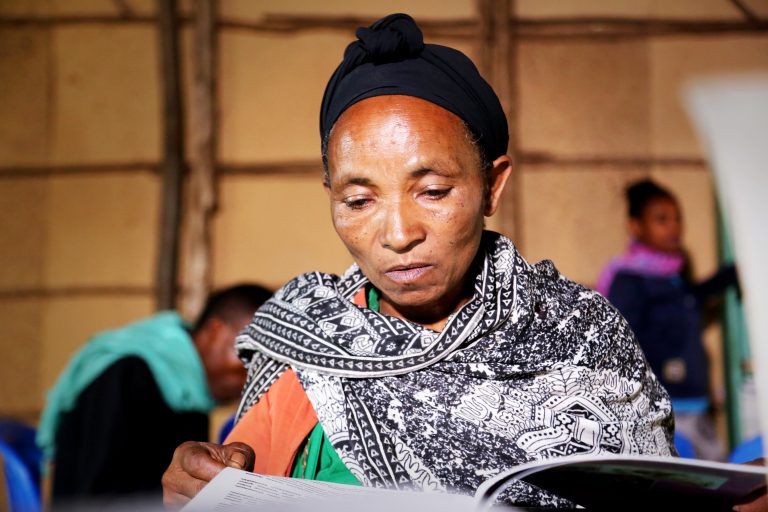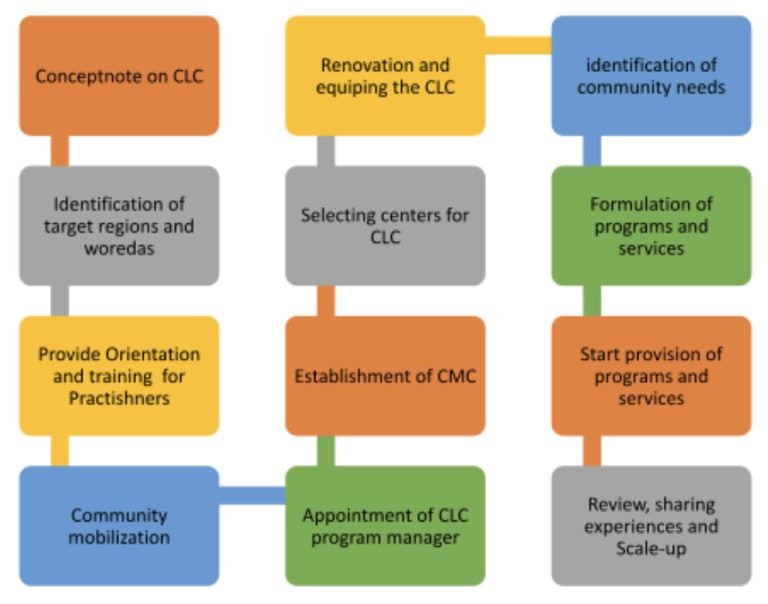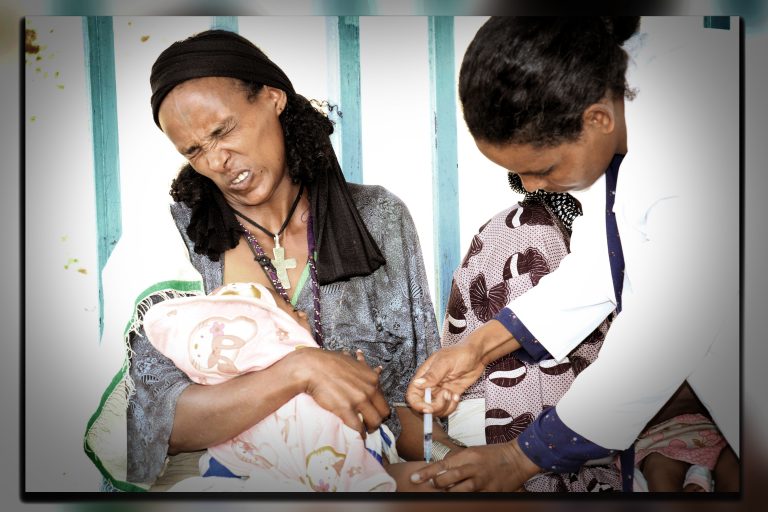A promising Adult Learning and Education (ALE) delivery mechanism
8 March 2021 | Eshetu Abate and Amanuel Hadera (DVV International Ethiopia) | DVV International Ethiopia Innovative Practice
An outline for the establishment and operationalization of pilot CLCs in Ethiopia.
1. Adult Learning and Education in Ethiopia
Ethiopia implements a number of adult learning and education programmes which combine functional literacy with agriculture and other livelihoods skills training. But graduates from these programmes, as well as other youth and adults in the communities, still remain with a variety of learning needs and interests. This indicated a need for community learning centres to provide a venue for these youth and adults to acquire skills and learning opportunities.
DVV International staff from the East/Horn of Africa, together with government partners conducted an exchange visit to Morocco and have adopted, adapted and contextualised the lessons from Morocco to its own circumstances. This pilot is currently being up-scaled by several regional governments with government funds and resources and has been incorporated by the government of Ethiopia in its medium-term strategic plans, the Education Sector Development Plan (ESDP V).
2. DVV International’s contributions to the establishment of CLC pilot projects in Ethiopia
Over the last 5 years DVV International, with government partners, has initiated the piloting of Community Learning Centres (CLCs) in six regions of Ethiopia: Amhara, Tigray, Oromia, SNNPR, Benshangul Gumuz and Addis Ababa.
Community Learning Centres are places where youth and adults can access a variety of learning opportunities and services such as IFAE (Integrated Functional Adult Education), agriculture skills training, etc. These centres are established and managed with financial and technical resources from both government and DVV International.
It requires a multi-sector approach involving various government sector offices at all levels. Communities also contribute in kind towards CLCs with labor, etc. The demand for CLCs and the services it offers is growing and some regional governments have taken the initiative to contribute additional resources towards the expansion of Community Learning Centres (CLCs) to more woredas.

3. Creating Community Learning Centres
There are two phases in the implementation of CLCs: the foundation and the operational phase.
During the foundation phase attention is given to activities such as:
Agreeing on the place where the CLC will be established according to criteria developed by DVV International and government partners. The preference is for existing buildings or structures such as farmer training centers, and others. CLCs also need land for agricultural demonstration plots, sport activities, and so on.
The renovation of existing buildings with the help of DVV, government and communities.
Conducting a situational analysis to determine the interests and needs of the community in the kind of services the CLC should offer.
Establishing management structures and assigning government staff to facilitate different training and services at the CLC (e.g. facilitators for IFAE classes, agricultural extension workers and a CLC Coordinator from the Education office). The technical committees, comprising of technical experts from all sector offices at local government (kebele and woreda) and regional levels, need to be put in place. Training for committees and staff needs to be done. A Centre Management Committee (CMC), comprising of community leaders, is also formed and trained to interact with the government technical committees and ensure the CLC is managed well.
Plans and budgets for services are drawn up and the CLC can start services.
During the operational phase the CLC starts to offer services to the community such as IFAE, agricultural and other forms of livelihoods skills training, business skills training, savings schemes and co-operative training, libraries, kindergarten, sports activities and games for young and old as well as community meetings, and so on.. The CLCs can offer one stop services and government offices can also conduct other services such as vaccination and information days, distribution of malaria nets, community dialogue and peace building initiatives, and others.
The DVV Ethiopia country office has developed training manuals on both the foundation and operational phases of CLCs. DVV International plays a key role in the capacity building of all government sector offices at all levels of implementation to establish and manage CLCs. The CLC process can be presented as follows:

4. National and regional support for CLCs
To increase participation in adult and non - formal education programmes for the overall empowerment of the community, the Ethiopian government has acknowledged CLCs as a vital instrument for its achievement. The education sector development plan of Ethiopia (ESDP V) has clearly indicated a strategic focus on the establishment and expansion of CLCs, including supported focus on creating and sustaining a literate environment.
At regional level, government education bureaus, together with other sector offices, have learned lessons from and appreciate the impact of the pilot CLCs. Two regional states have started a systematic up-scaling of CLCs to all districts in their regions with their own resources.

5. Lessons learned
In the past four years, a number of remarkable achievements have been observed in the existing pilot CLCs. However, it was also noted that some CLCs were lagging behind and there is a level of disparity as far as the quantity and quality of services provided are concerned. This has been addressed through different types of workshops and training programmes and organizing experience sharing events among CLCs. The experience sharing events took place with structured checklists for learning and briefing and debriefing sessions prior and after the event. Workshops and meetings have also been conducted with senior level management from government to ensure CLCs are institutionalized and owned by government for long term sustainability of services.